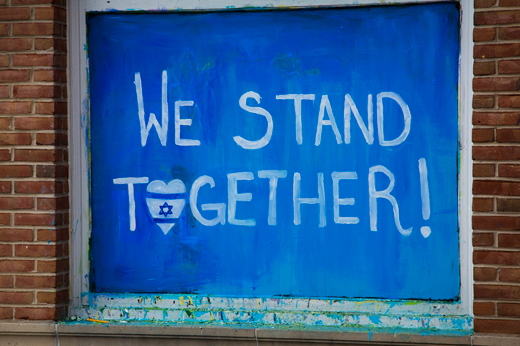The day after crude graffiti and Nazi swastikas were found spray-painted on Emory's Alpha Epsilon Pi fraternity house, Professor Deborah Lipstadt wasn't surprised to hear student sentiment about it surface in her classrooms.
There were words of anger and frustration and even a few tears about what had been scrawled on the walls of the historically Jewish fraternity, recalled Lipstadt, a professor of modern Jewish history and Holocaust studies who has written extensively on modern strains of anti-Semitism.
But rather than fear, Lipstadt heard expressions of indignation. The act, committed Oct. 5, shortly after the end of Yom Kippur, was completely out of step with their own experiences at Emory, many students reported.
"Whatever the objective was of the person who did this, certainly the campus reaction has been the exact opposite of what they hoped to achieve," Lipstadt recalls one student observing. "Just look at the response."
From a statement from Emory President James Wagner denouncing "this abhorrent act" as an offense against the Jewish community and "an attack against everything for which Emory stands," to an all-campus invitation from the Student Government Association Executive Board to wear blue last Monday in support of Emory's Jewish community, gestures of campus support quickly emerged.
"I looked out on the Quad that day to find a sea of blue," Lipstadt says. "Students even hung blue bed sheets out their windows."
Despite an approaching fall break, the community response only gained steam throughout the week. At Candler School of Theology, divinity student Brenna Lakeson set up a table and invited faculty, staff and students to pen notes of support to AEPi. On Wonderful Wednesday, a group of Emory students passed out 150 free t-shirts that they had stayed up late the night before to hand-stencil. Fraternities decorated their houses with blue crepe paper; sororities along Eagle Row painted messages of unity on their windows.
Throughout the week, the AEPi fraternity received dozens of cards and letters of support — a note of solidarity from Students for Justice In Palestine, a student Palestinian advocacy group, was especially meaningful, says Emory's Alpha Epsilon Pi Chapter President Jack Kuhr.
"The support we've received from throughout the community has been tremendous," says Kuhr, a junior studying economics and history.
"What happened was a horrific isolated incident — not something we've come to expect at Emory and not something we'd expect in the future. To see everyone come together around us was uplifting."
Teaching against hate

Emory students (left to right) Amiel Fields-Meyer, Havi Rosen, Emily Plotkin, Aaron Karas and Ovadia Harary (kneeling) countered the spray-painted graffiti with t-shirts they made and distributed at Wonderful Wednesday. Photo courtesy Ami Fields-Meyer.
In response to the AEPi vandalism, Emory's Tam Institute for Jewish Studies will sponsor a public "Teach-In Against Hate" on Wednesday, Oct. 15, at 3 p.m. on the steps of the Administration Building on the Emory Quadrangle. In case of rain, it will be held in the Cox Hall ballroom.
"To honor the values of the university, we thought the best thing we could do as a faculty is to respond by teaching," says Eric Goldstein, Judith London Evans Director of the Tam Institute for Jewish Studies and associate professor of history and Jewish studies, who spearheaded the idea of a teach-in.
Co-sponsored by the Office of Spiritual & Religious Life, the Inter-Religious Council, the Department of African American Studies, Emory Hillel, Emory Chabad and Alpha Epsilon Pi Fraternity, the event will address anti-Semitism while also exploring broader questions.
"This act was an example of anti-Semitic expression, but also, in the broadest sense, of hate," Goldstein says. "We'll discuss how to respond and understand it in a campus environment and what each of us can do to break down barriers of ignorance and prejudice that make acts like this possible."
The entire Emory community is invited to attend the teach-in, which will feature Emory faculty representing a variety of backgrounds, perspectives and disciplinary specialties. In addition to Lipstadt and Goldstein, speakers include Andra Gillespie, interim chair of the African American Studies Department and associate professor of political science, and Bridgette Young Ross, dean of the Chapel and Spiritual Life.
In a recent letter in the Emory Wheel campus newspaper, Young Ross and Ajay Nair, senior vice president and dean of Campus Life, wrote in support of responding to the vandalism — now under investigation by the Federal Bureau of Investigation — with both dialogue and action.
"Beyond our shared anger, let us recognize that in response to this affront, there is an opportunity for us all — as a community of students and educators — to learn, teach, reach out, advocate and heal," they wrote.
"Let us embrace this opportunity for learning, understanding and outreach, as each of us has been so moved by this incident in our daily lives."
Seeking scholarly context
One message Lipstadt will bring to Wednesday's teach-in: An attack on one group at Emory is an attack on all groups.
"All people who value reasoned discourse in a free, multicultural, democratic, enlightened society, and everything that goes with it, should be worried about what (an act like this) says about the society in which we live," she says.
Andra Gillespie, interim chair of the African American Studies Department, says her department will participate in the teach-in as a show of solidarity, "to be on the record as speaking out against hate."
"It's important to express support and empathy with other groups, to challenge people to remain vigilant about prejudice and bigotry, whether or not you were directly impacted by it," Gillespie says. "You don't have to be Jewish or a member of AEPi to recognize that this was wrong."
Broaching the issue in a scholarly framework not only makes good use of the rich resources of a liberal arts university, it may provide a spark for further intellectual inquiry among those participating.
"Here's where a liberal arts education is quite valuable — we have people who actively study these types of issues," Gillespie says.
"I hope that if students have been having conversations about this in a vacuum, discussing and teaching each other, that my colleagues and I will be able at least to challenge them to think a little more critically about these issues and seek out additional knowledge so that they have the tools to be pro-active," she adds.
Uniting the spiritual community
The day after the vandalism was reported, Young Ross met with Emory's Inter-Religious Council, a group that strives to share dialogue and build bridges among some 30 campus groups representing a variety of faiths.
Beyond the dismay, Young Ross heard other questions: How can the campus be more united every day, without something negative happening to spur action? How can we become better citizens of our own community by being more affirming, encouraging and positive?
In speaking at the teach-in, she will share some of that dialogue. "What it means to be a community that recognizes, respects and celebrates difference is more than only condemning negative acts," Young Ross says.
For example, Young Ross points out that the vandalism has already stimulated important campus conversations over concerns that Nazi swastikas are now considered a universal symbol of hate, ignoring auspicious and religious meanings they've long held in the Hindu faith. As she learned from Hindu students, the word "swastika" comes from the Sanskrit word svastika. Su means "well" and asti means "to be" — so its literal transition in Sanskrit means "to be well."
As a spiritual advisor, "without exception, what I've heard from Jewish students is that they've been encouraged by the positive outpouring of support from across the community," she notes. "This teach-in could be helpful in determining that people feel they can be fully themselves."
At Emory's Marcus Hillel Center, Rabbi Russ Shulkes, who serves as one of the Jewish chaplains at Emory, has had similar conversations with Jewish students. "This (vandalism) was absolutely not in line with Emory's ethos or background — I think every student that is here knows that," he says.
Shulkes supports the idea of a teach-in. "That is always what should take place whenever you have a negative experience — to make something positive come out of it," he says.
At the Hillel Center, plans are already in the works to schedule a campus event in response to the vandalism following this week's Jewish holidays, Shulkes says, with details to be released next week.
For more information on the teach-in, call the Tam Institute for Jewish Studies at 404-727-6301.

